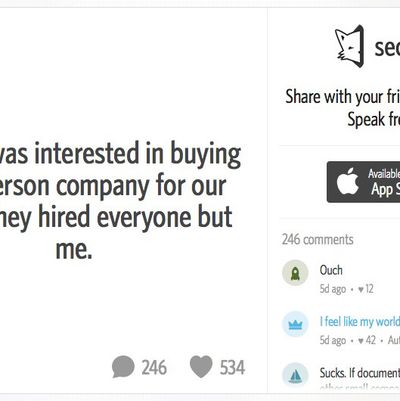
Last week, amid the overwrought start-up angst and sexual escapades that clutter the anonymous messaging app Secret, a hint of genuine drama emerged: a post that said, “Google was interested in buying my 5 person company for our team. They hired everyone but me.”
In subsequent comments, the shafted start-up striver added more details: She was the only female at her company, a designer who had been with the start-up from the beginning and had overseen its design and marketing, yet had gotten left out when the company was sold to Google for its workers, in what’s known as an acqui-hire. “I feel like my world just ended,” she wrote.
The thread quickly became the talk of Silicon Valley. It was seeming proof that even within the happy-go-lucky world of tech start-ups, there are winners and losers, and more often than not, the losers in situations like these are the designers, who are more likely to be female than their engineer counterparts, and whose “soft” skills are seen as less valuable than coding chops.
On Monday night, the woman who posted the Secret called me. For nearly an hour, “Amy” (she gave me her real name, but asked me not to use it) told me about her situation – how she’d helped build her start-up from the ground up, how she’d gotten left out of the Google deal, and how she’d kept it under wraps until recently. When posting about it on Secret, she left a lot vague so as not to give away her identity, but the details she provided to me off the record all checked out.
To hear her tell it, Amy’s start-up decided to sell itself to Google as a last resort, after failing to find traction in the market. Google agreed to buy the company for a relatively modest amount, then interviewed all five members of the company before extending job offers to everyone but her. Making offers to four-fifths of a company as part of an acqui-hire, while legal, is nearly unheard of in Silicon Valley, where mergers and acquisitions are still generally governed by a certain type of decorum.
Amy was heartbroken. Since joining the company, she had been paid a salary of $60,000, half what her male colleagues made. Under the terms of Google’s offer, Amy’s start-up received enough money to pay back its original investors, plus about $10,000 in cash for each employee. Amy’s CEO was hired as a mid-level manager, and her engineering colleagues were given offers from Google that came with $250,000 salaries and significant signing bonuses. She was left jobless, with only $10,000 and a bunch of worthless stock.
“I did our user experience, our logo, the marketing – all that stuff,” she said. “When this went down, I was like, Is this really happening?”
Amy admits she’ll “never know” if she wasn’t hired by Google because she’s female, because she’s not an engineer, or whether there was something else wrong with her application. On Secret, dozens of commenters rushed to her side with advice about how to lawyer up and pressure Google to rectify the situation. But she’s not ready to come forward publicly or file a lawsuit, in part because it would require admitting the possibility that she simply wasn’t Google material.
“It’s embarrassing, I guess,” she explained. “My social group is really successful. If I heard this about one of my friends, I’d think, This person failed at negotiating, or their company wasn’t that great. And going public? I mean, I know how women who fail in this industry are treated.”
Silicon Valley is known for embracing failure when it comes to start-ups going bust, but Amy felt silenced. Before Monday, the only person who knew what happened with Google was her boyfriend.
“I’ve told people, ‘Google acqui-hired us, it was great.’ Because I’m so fucking horrified,” she said. “I can’t tell everyone what I told Secret, which is, Google acqui-hired everyone but me.”
Amy, who has worked at several start-ups before, admits that she isn’t hard up for money – her live-in boyfriend is “very financially successful” – but she said that her financial cushion had made it easier for her colleagues to leave her behind.
“Their attitude was, We can leave you with nothing because you’re a girl and you have a rich boyfriend,” she said.
Amy’s former co-workers, and their acquirers at Google, may have a different view of what happened. (Google declined to comment, and I couldn’t reach out to any of Amy’s ex-colleagues without outing her.) In any case, Amy’s post has quickly proven that the Secret app – which is something of a lightning rod among tech types – has a function in Silicon Valley. By enabling its users to speak up anonymously about workplace drama and boardroom betrayals, the app breaks down some of the Valley’s positive-thinking force field. Amy’s Secret post has 246 comments and 536 “hearts” as of yesterday, and has inspired messages of support as well as anger. (“Your cofounders are douchelords,” one commenter wrote. “Don’t give up, fight for your fair share,” another wrote.) She’s also gotten offers to help her find other work in the tech industry and has heard from entrepreneurs who say they’ll think twice before selling their companies to Google.
Talking through her tears on Monday night, Amy said she didn’t know if she’d be able to recover from what she considered the worst setback of her professional life. After what happened at Google, she wasn’t even sure she could bring herself to interview for another job.
“I feel like I have no power, that this happened to me, and it’s my fault,” she said. “I feel so betrayed. And, at this point, I don’t really feel like I have it in me to fail again.”





























